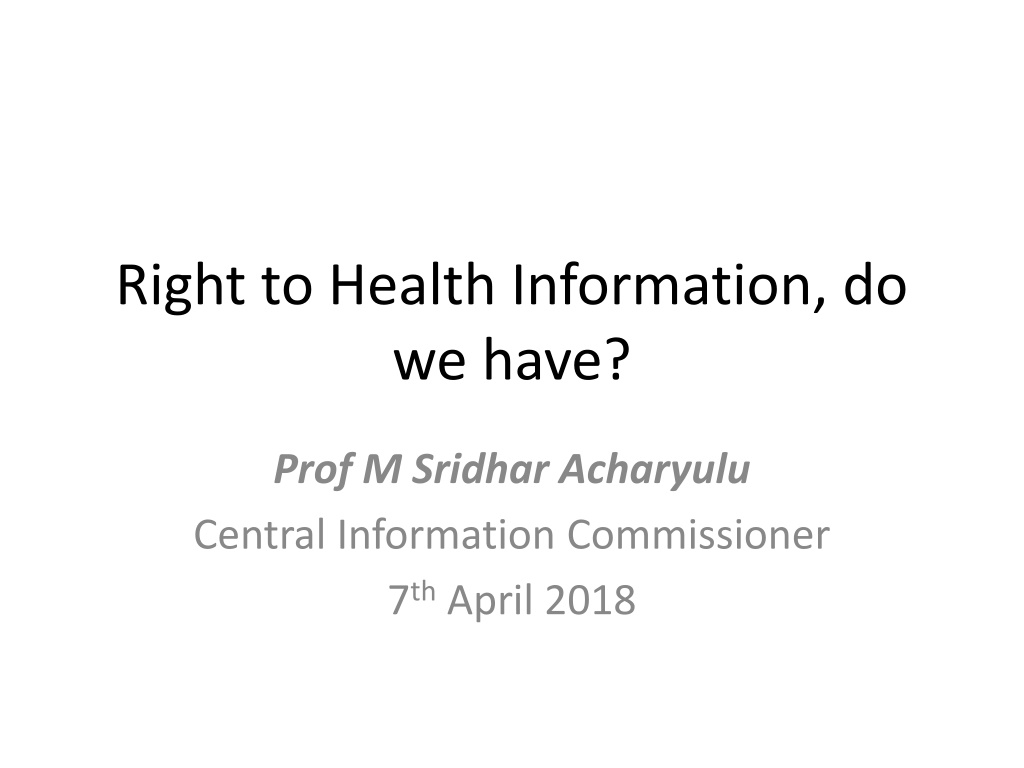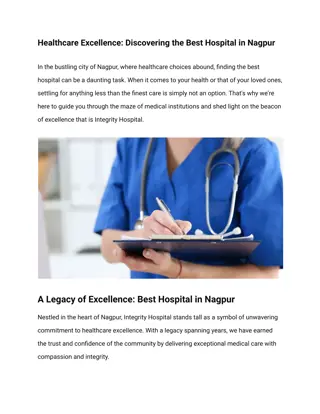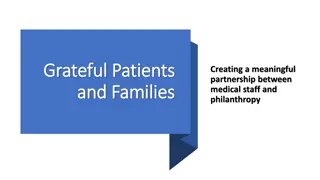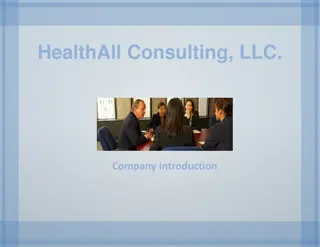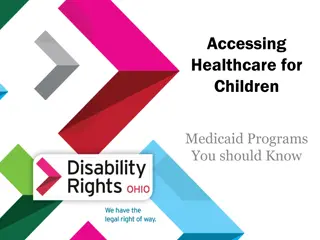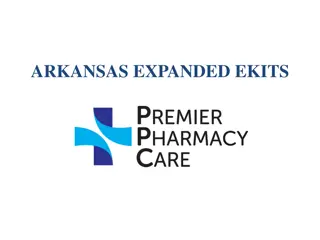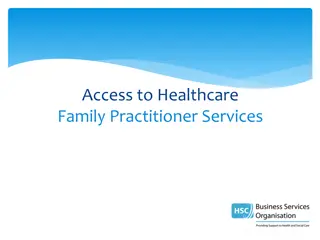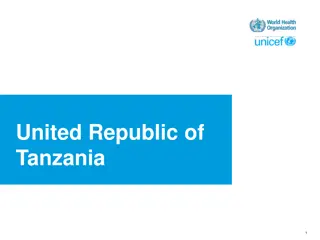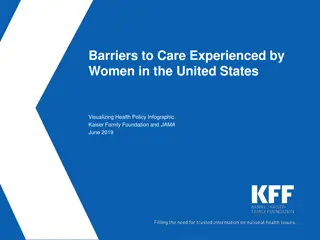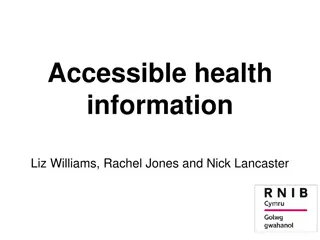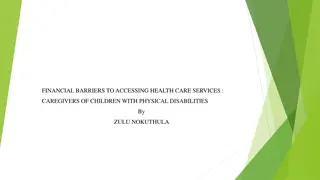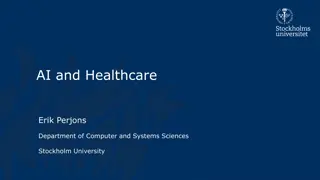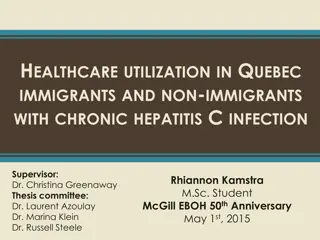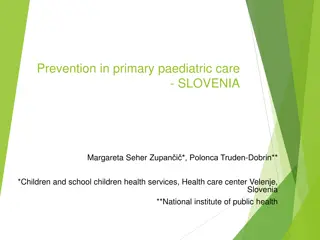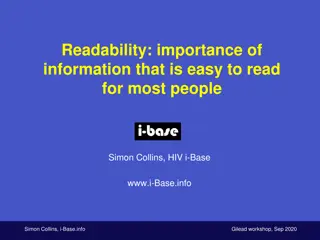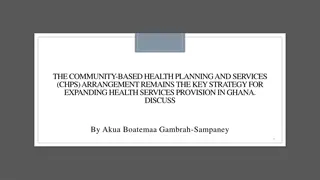Challenges in Accessing Healthcare Information and Services
The excerpts highlight the challenges in obtaining healthcare information and services, including issues with overcharging, lack of transparency, and unethical practices in the medical field. Patients face difficulties in accessing affordable and reliable healthcare, often falling victim to exorbitant bills and negligence. The narrative sheds light on the complex interplay between health, wealth, and power dynamics in the healthcare system.
Download Presentation

Please find below an Image/Link to download the presentation.
The content on the website is provided AS IS for your information and personal use only. It may not be sold, licensed, or shared on other websites without obtaining consent from the author. Download presentation by click this link. If you encounter any issues during the download, it is possible that the publisher has removed the file from their server.
E N D
Presentation Transcript
Right to Health Information, do we have? Prof M Sridhar Acharyulu Central Information Commissioner 7thApril 2018
Pulse to purse to policy. Right to health is part of Right to life. Do we have it? At least, do we have Right to Health information? Earlier Doctors used to diagnose by seeing pulse. Later they looked to purse. Now they look to your policy (insurance) We all know health is wealth: Our ill-health is their wealth. And we don t even know!
Harih: Narayana I ar re jarjar bh te vyadhigraste kalebare au ada j hnav toya vaidyo nar y o hari (=when the body is subjected to decay due to old age and all sorts of ailments attack it the only medicine is the holy waters of Ganga and the doctor is Lord Krishna, Hari, the Narayana)
Tragedy of treatment 7 yr old Aditya s brain might have dead a week ago, kept on artificial ventilator. Parents begged to release her, they insisted on signing leaving against medical advice , refused ambulance, charged for the gown child was wearing, as she could not wear her own because body bloated. They billed Rs 15.6 lakh for various things including charges for the use of 661 syringes and 1,546 pairs of gloves: average 2 syringes & 5 pairs of gloves every hour that child was in hospital.
Over charging An investigation by the government found that the hospital overcharged by 108 per cent profit for medicines used and by 1737 per cent for other consumables. It may be noted that no medical facility is legally allowed to charge more than the maximum retail price of a medicine. By charging double for medicines used, the hospital had added over 3 lakhs to the hospital bill
Ethics and crimes Indian Journal of Medical Ethics published an article by Lopa Mehta. She says: There is no rational basis for current practices in fee charging. There are no laws or norms in this regard . Myriad forms of medical negligence cause damage. Those could be civil wrong, breach of contract, criminal negligence etc, the state has a duty to establish system and mechanism to ensure remedies to the victim-patients.
If survived the doctor, bill kills The billing section holds complete control over the case sheets, not even the doctor. Patient totally depends upon the mercy of treating doctor and the hospital staff. Patient under the grip of fear unless he has abundant black money or wonderful influence or political power.
Consumer Protection Act Service means and includes medical treatment Consumer = patient Indian Medical Association Vs. V.P Shantha [1995(6) SCALE 273] Hon'ble Supreme Court of India has stated that "Service" rendered by Medical practitioner were covered under Consumer Protection Act. One of the important rights of the consumers is right to be informed about the service.
Rights of consumer Section 6 of CPA: Objects of the Central Council: The objects of the Central Council shall be to promote and protect the rights of the consumers such as (a) the right to be protected against the marketing of goods and services, which are hazardous to life and property; (b) the right to be informed about the quality, quantity, potency, purity, standard and price of goods or services, as the case may be, so as to protect the consumer against unfair trade practices; Deficiency = any fault, imperfection, shortcoming, inadequacy in the quality etc. Unfair trade practice
Consumers right to be informed Ozair Husain Vs Union of India [AIR 2003 Delhi 103], the bench of A D Singh, M Mudgal held that consumer had right to information. "freedom of expression enshrined in Article 19(1)(a) can serve two broad purposes (1) it can help the consumer to discover the truth about the composition of the products, whether made of animals including birds and fresh water or marine animals or eggs, and (2) it can help him to fulfill his belief or opinion in vegetarianism".
Medical Council Act 1956 Section 20A read with section 33(m) of the Indian Medical Council Act, 1956 (102 of 1956) Professional Conduct, Etiquette and Ethics for registered medical practitioners: Maintenance of Medical Records: 1.3.1. Every physician shall maintain the medical records pertaining to his/her indoor patients for a period of three years from the date of commencement of the treatment in a standard proforma laid down by the Medical Council of India and attached as Appendix 3. 1.3.2. If any request is made for medical records either by the patients/authorised attendant or legal authorities involved, the same may be duly acknowledged and documents shall be issued within the period of 72 hours.
Raghunath case Bombay HC Raghunath G Raheja v Maharashtra Medical Council, [11.1.1996, AIR 1996 Bom 198, Bench: M Shah, A Savant, https://indiankanoon.org/doc/1068495/], Bombay High Court upheld the right of patient to medical record very emphatically. The High Court also directed Maharashtra Medical Council to issue necessary circulars in this behalf to all the hospitals and doctors in the State of Maharashtra. HC said: We do not think that the hospitals or the doctors can claim any secrecy! or any confidentiality in the matter of copies of the case papers relating to the patient. These must be made available to him on demand, subject to payment of usual charges. If necessary, the Medical Council may issue a press-note in this behalf giving it wide publicity in all the media .
Kerala HC confirmed Kerala High Court recognizing the above principle in Rajappan Vs. Sree Chitra Tirunal Institute for Medical Science and Technology [ILR 2004 (2) Kerala150] Kanaiyalal Ramanlal Trivedi v Dr. Satyanarayan Vishwakarma 1996; 3 CPR 24 (Guj); I (1997) CPJ 332 (Guj); 1998 CCJ 690 (Guj), the hospital and doctor were held guilty of deficiency in service as case records were not produced
Destroying medical records In S.A.Quereshi v Padode memorial Hospital and Research Centre II 2000. CPJ 463 (Bhopal) Hospital found negligent as he should have retained the case records until the disposal of the complaint. Dr. Shyam Kumar v Rameshbhai, Harmanbhai Kachiya 2002;1 CPR 320, I (2006) CPJ 16 (NC). The National Commission said that not producing medical records to the patient prevents the complainant from seeking an expert opinion and it is the duty of the person in possession of the medical records to produce it in the court and adverse inference could be drawn for not producing the records.
Case Sheet, Negligence Force v. M Ganeswara Rao 1998; 3 CPR 251; 1998 (1) CPJ 413 (AP SCDRC) that there was negligence as the case sheet did not contain a proper history, history of prior treatment and investigations, and even the consent papers were missing. In V P Shanta v. Cosmopolitan Hospitals (P) Ltd 1997;1 CPR 377 (Kerala SCDRC) the State Commission held that failure to deliver Xray films is deficient service. The patient and his attendants were deprived of their right to be informed of the nature of injury sustained.
Originals lost Devendra Kantilal Nayak v Dr. Kalyaniben Dhruv Shah 1996;3 CPR 56; I (1997) CPJ 103; 1998 CCJ 544 (Guj) the State Commission disbelieved the evidence of the surgeon because only photocopies were produced to substantiate the evidence without any plausible explanation regarding the absence of the original.
No mention of anaesthetist Meenakshi Mission Hospital and Research Centre v. Samuraj and Anr., I (2005) CPJ (NC) held that the hospital was guilty of negligence on the ground that the name of the anesthetist was not mentioned in the operation notes though anesthesia was administered by two anesthetists.
In UK Data Protection and Access to Health Records, UK The UK's Data Protection Act 1998 gives an individual a right of access to information held about him. The Access to Health Records Act 1990 gave access to a patient's medical records in noncomputerized form, while Data Protection Act 1998 Act gives access to both electronic and nonelectronic records.
2(f) of RTI Act Right to Information Act, 2005 provided access to records held by Government Hospitals. How about private hospitals? As discussed above, law mandates both private and public doctors to provide access to medical records. Definition of the information the RTI Act under Section 2(f) of the RTI Act, provides access to info held by private hospitals through Govt
CIC order The Commission held in NP Bhatia v IHBAS (CIC/AD/A/2013/001681SA on 23.4.2014 https://indiankanoon.org/doc/138743027/) that the patient's right to obtain his medical record is not only protected under RTI Act, but also under the regulation of Indian Medical Council, which is based on world medical ethics, and also as a 'consumer' under Consumer Protection Act, 1986
Record of others Can a spouse seek the medical information of the other spouse? The CIC decision on 10th April 2015 in Ms JJ v. PIO, Institute of Human Behaviour & Allied Sciences, [CIC/KY/A/2014/001348-S Medical records of other person is personal information of that person, hence cannot be disclosed as exempted by the Section 8(1)(j) of the RTI Act. But in public interest, it can be disclosed
Ground for divorce Section 13(i)(v) of the Hindu Marriage Act, 1955, provides that a marriage can be dissolved on the ground that the other party has been incurably of unsound mind, or has been suffering continuously or intermittently from mental disorder of such a kind and to such an extent that the petitioner cannot reasonably be expected to live with the other.
Public money spent Surupsingh Hrya Naik vs State Of Maharashtra decided on 23 March, 2007,AIR 2007 Bom 121, a private citizen sought the medical reports of Naik, legislator, who was convicted for contempt of court. It was held that it was in public interest to know why a convict is allowed to stay in an air conditioned comfort of the hospital and there had been intensive questioning about this aspect in the media and the people s mind.
Prabhat Kumar case Prabhat Kumar s father was admitted into the hospital with the complaint of constipation, he was kept in the ICU, spent nearly Rs.18 lakh on his father s treatment in a private Hospital, and in spite of that he expired. Prabhat sought record of treatment under RTI, that was denied claiming that Private Hospital is not public authority under 2 (h). Under 2(f), the CIC directed to furnish entire information. GNCTD CIC/SA/A/2014/000004
Mr X v Hospital Z Mr X v Hospital Z [(decided on 21stSept 1998) S Saghir Ahmad, BN Kirpal JJ SC. https://indiankanoon.org /doc/ 382721/], is a case where the issue before the Supreme Court was disclosure of information of a patient affected by HIV to his fianc . Itoku Yepthomi was advised to go to Z hospital Chennai and Dr X was asked to accompany.
Confidentiality International Code of Medical Ethics has laid down that: "A physician shall preserve absolute confidentiality on all he knows about his patient even after his patient has died. A Code of Medical Ethics has been made by the Indian Medical Council which, inter alia, provides as under: "Do not disclose the secrets of a patient that have been learnt in the exercise of your profession. Those may be disclosed only in a Court of Law under orders of the presiding judge."
Confidentiality of patient info Dr. Tokugha Yeptomi V Appollo Hospital Enterprises Ltd and Anr, III 1998 CPJ 132 (SC) it was held that not maintaining confidentiality of patient information could be an issue of medical negligence.
Great Britain The General Medical Council of Great Britain in its guidance on HIV infection and AIDS has provided as under: "When diagnosis has been made by a specialist and the patient after appropriate counseling, still refuses permission for the General Practitioner to be informed of the result, that request for privacy should be respected.
Xs Privacy v Ys Life Having regard to the fact that the appellant was found to be HIV(+); its disclosure would not be violative of either the rule of confidentiality or the appellant's Right of Privacy as Ms. 'Y' with whom the appellant was likely to be married was saved in time by such disclosure, or else, she too would have been infected with the dreadful disease if marriage had taken place and consummated.
Ground for divorce Hindu Marriage Act Section 13: Any marriage solemnized, whether before or after the commencement of this Act, may, on a petition presented by either the husband or the wife, be dissolved by a decree of divorce on the ground that the other party (i) xxx xxx xxx (v) HAS BEEN SUFFERING FROM VENEREAL DISEASE IN A COMMUNICABLE FORM. Section 27 of the Special Marriage Act, the party to a marriage has been given the right to obtain divorce if the other party to whom he or she was married was suffering front venereal disease in a communicable form.
Right to marry with duty to inform A person may have a right to marry but this right is not without a duty, If that person is suffering from any communicable Venereal disease or is impotent so that marriage would be a complete failure or that his wife would seek divorce from him on that ground, that person is under a moral, as also legal duty, to inform the woman with whom the marriage is proposed that he was not physically healthy and that he was suffering from a disease which was likely to be communicated to her
S 269 IPC Indian Penal Code says: s269. Negligent act likely to spread infection of disease dangerous to life, Whoever unlawfully or negligently does any act which is, and which he knows or has reason to believe to be, likely to spread the infection of any disease dangerous to life, shall be punished with imprisonment of either description or a term which may extend to six months, or with fine, or with both.
S 270 Crime Section 270 IPC says: 270. Malignant act likely to spread infection of disease dangerous to life, Whoever malignantly does any act which is, and which he knows or has reason to believe to be, likely to spread the infection of any disease dangerous to life, shall be punished with imprisonment of either description for a term which may extend to two years, or with fine, or with both."
Direction of DHC Around 20 hospitals in Delhi have got Government Land at concessional rate with a condition that they treat some BPL free of cost. The DHC in a PIL considered files of 20 such private hospital allottees and directed that all other hospitals to strictly comply with the terms of free treatment to indigent /poor persons of Delhi i.e 25% OPD and 10% IPD patients. Therefore the Government hospitals should refer the poor patients to the private hospitals where the requisite facilities are available. CIC directed furnish information sought under RTI. CIC/SA/C/2014/000223
RTI requests State has a duty to inform people about queries on rate of stents, biomedical tests, drug safety tests, implementation of guidelines of clinical trials, using animals or human beings for clinical tests, other medical devices and the rates, etc
Muslim and Parsi Acts Section 2 of the Dissolution of Muslim Marriages Act, 1939 sets but that if the husband is suffering: from a virulent venereal disease, a Woman marriage under Muslim Law to such person shall be entitled to obtain a decree for dissolution of her marriage. Parsi Marriage and Divorce Act, 1936, one of the grounds for divorce set Out in Section 32 is that the defendant has, since the marriage, infected the plaintiff with venereal disease.
